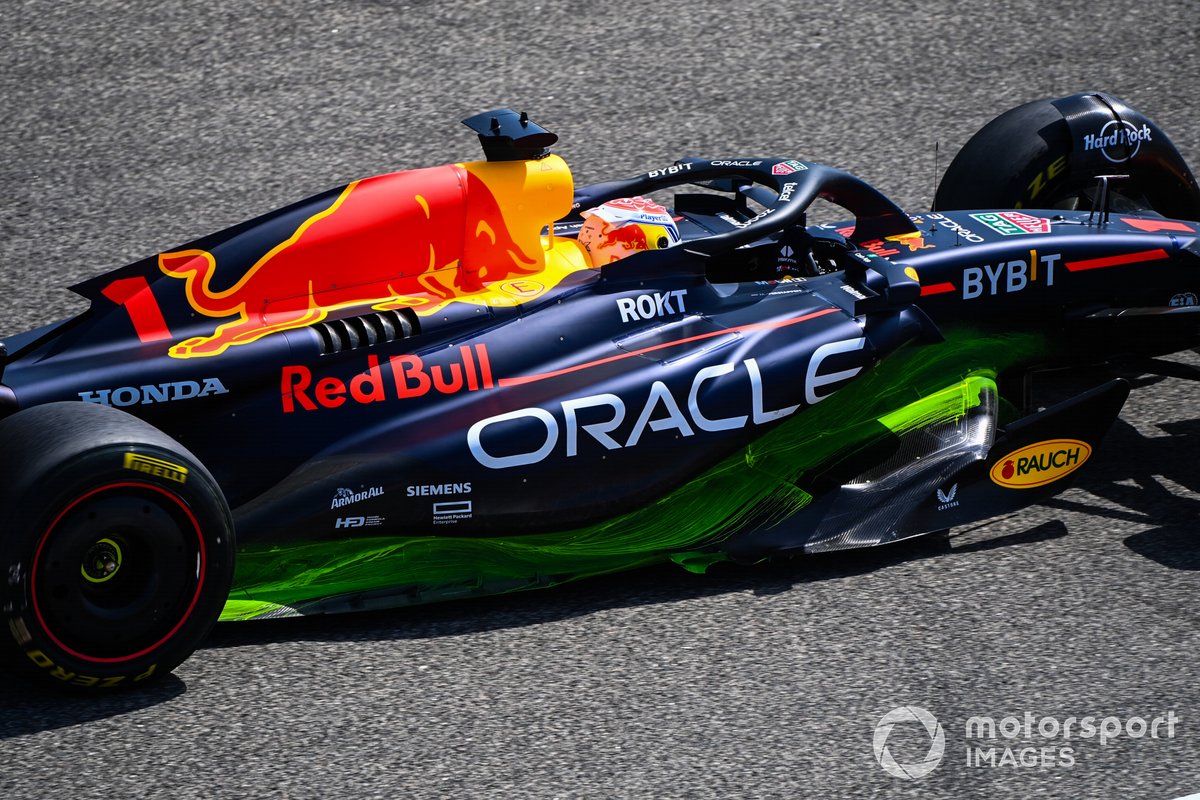
Haas is one of three teams, including Red Bull Racing and Mercedes, to have mounted a winglet on the inboard rear quarter of the front wing endplate.

In this case, the Haas winglet also has a slot to marry-up with the slots below it between the front wing elements.


Sticking with the rear inboard corner of the front wing endplate, but this time on the Aston Martin AMR23, where we find that the rearmost flap isn’t fully attached, and a small notch has also been taken out of the element ahead.
Aston is clearly looking to help improve the outwash that is generated by the rear section of the endplate and wing elements here, in much the same way Mercedes has with its designs, both this and last year.
To help maintain rigidity this section, the Aston also has metal inserts, rather than just being made up from carbon fibre, as the rear element sits away from the main body of the endplate.

The Red Bull RB19 finally broke cover, giving us a wide array of details to examine. Notably, here we can see the width of the nose has increased at the tip, with a NACA duct being used for cooling this season, rather than the oval-shaped inlet used last year.
You’ll also note that Red Bull has mounted a winglet on the inboard rear lower corner of the front wing endplate to help with the outwash effect.

Red Bull, like many of the other teams, painted flo-viz paint on its car during the first session of pre-season testing to evaluate whether the bodywork was achieving its aims, aerodynamically-speaking.
In the first image we can see the car as it emerges from the garage with the paint having just been applied.


Fast-forward to the shots of the car on track and we can see how the airflow has created a visual representation of the flow field in the oil-based paint.

Red Bull took a more focused approach to its flow-viz application on the rear three quarters of the sidepods downwash ramp, as once again it was looking for visual confirmation of the airflow’s performance.

Mercedes also has winglets mounted in the lower rearmost inboard corner of the endplate, which complements the continued desire to generate outwash, having found a way to defeat the changes made to the regulations by the FIA in this region for 2023.
Also note the three chequered stickers fixed to the upper portion of the endplate, which act as reference points for the high-speed camera that will look across at them from the nosecone region.
This footage will be reviewed to see how much the endplate flexes under load, in order to check compliance and also see if there’s still some margin available for additional flex to be built-in.

Ferrari’s front suspension is a little more angled for aerodynamic gains, similarly to some rivals but, to keep the chassis as high as possible elsewhere, it has created a keel section for the rear leg of the lower wishbone.

A close-up of the AlphaTauri AT04’s floor gives us a good view of the new edge wing, which has some of the same DNA that we saw in McLaren’s design last season, and also features on the MCL60.
The flap is raised above the floor level and has a number of flow-diverting elements to help focus the airflow as it emerges from out under the floor.
This will help reduce any ill effects posed by the turbulent wake created by the front tyre, that might otherwise be ingested by the underfloor and could be detrimental to its aerodynamic performance.


Red Bull has made changes to the internal brake ducting for 2023, expanding upon the fairing solution used last season which encloses the brake disc (right).
It’s a solution that we’ve seen many other teams use too, and while Red Bull made extensive progress throughout the course of 2022, with various shapes and coatings employed, it obviously felt there were more gains to be had and decided to overhaul the design.
Furthermore, we know there have been changes to the front tyre by Pirelli, which might also play into these alterations, which is about creating the right set of thermal conditions between the brake assembly, the wheel rim and the tyre in order to enhance performance.







